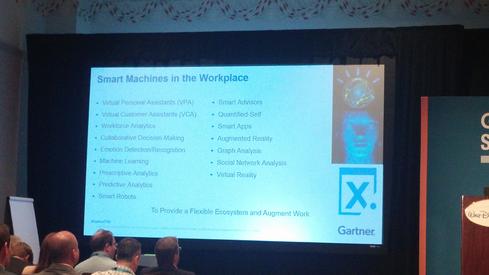Imagine Retail Without Sales Associates, Gartner AsksImagine Retail Without Sales Associates, Gartner Asks
A Gartner analyst uses the vision of a workplace without associates as a great jumping-off point to talk about how to integrate technology into the brick-and-mortar store of tomorrow.


Apple, Microsoft, IBM: 7 Big Analytics Buys You Need to Know
Apple, Microsoft, IBM: 7 Big Analytics Buys You Need to Know (Click image for larger view and slideshow.)
At the Gartner CIO Symposium, Gartner principal analyst Kelsie Marian asked a roomful of retail CIOs and other execs to imagine what their stores would look like without people. The thought exercise was designed to help envision the retail store of the future.
"Let's imagine that we in this room are the last generation of retailers to have humans working in our stores," Marian said. "Maybe this seems a little fantastic, but the truth is that we have a new class of smart machines that can get us closer to that reality. Probably the future is something between the store we know today full of associates and the idea of an associate-less store."
Marian went on to detail a series of smart technologies just beginning to make headway in retail from the types of robots Amazon uses in its warehouses, to smart advertising walls that see the gender of the viewer and advertise accordingly. She gave a long list of smart technology categories that retailers should consider, including predictive and prescriptive analytics, augmented and virtual reality, digital assistants, wearables, and other "quantified self" products. The total list is pictured here:
Perhaps the most interesting technology Marian showcased was the Oshbot being tested by OSH hardware. The Oshbot can understand both English and Spanish. It can give customers detailed information about a product in the store and even scan an object in a customer's hand to see if a store has it in stock. It can lead customers to the product's location in the store.
In other words, it does some of what a good sales associate already does.
Increasing Sales
Marian pointed to research conducted by Harvard Business Review that showed that retailers were able to increase sales by having knowledgeable associates. Consumers were asked to rate an associate's knowledge on a scale of 1 to 10.
When consumers rated an associate's knowledge below 7, they spent 25% less than customers who rated their associates higher. Higher ratings lead to higher sales.
It seems obvious that knowledgeable associates lead to more sales, but according to Marian, it is the most crucial point forgotten when automation efforts are brought to a retailer. Most retailers think of associates as a cost, so automation efforts have been designed to reduce staff.
Instead, she says, the goal should be to free staff for doing higher-margin activities. "Think augment and upskill versus a 1-to-11 remove-and-replace. If associates spend the majority of their time servicing the store, we can potentially free up associates for more customer-facing work."
Exactly what kind of technology you want to leverage to free your associates depends on the type of retail you are in.
Customers have slightly different needs depending on the sector of retail. For instance, she explained that customers in the grocery sector value stock on the shelves that is easy to find. In that setting, you might deploy smart technology to keep shelves stocked, or augmented reality technology to help customers find products faster
In fashion, however, consumers want to be able to try on a product, and they like easy returns. Smart products that leverage virtual reality to let the customers try things on without being in the store, or products that return stock to the floor more quickly after a return could help. The goal should be to make your associates, according to Marian, "more mobile, more informed, and more social."
[One of IWeek's Elite 100 is already doing much of this. Read Dollar General Turns Mobile Data Into Action.]
She added that you need to make sure you have a "people-centric" approach to technology.
"Focus on people. Make sure you give associates an idea of how they will be able to coexist with these technologies." She said that trust-building is a key feature, so that associates know the technology is not designed to replace them, but to help them do the most important work.
All of this adds up to a very startling conclusion.
Marian asked us to think of a store without associates. In the process, she made an argument for how associates are actually vital to any digitalization of a retail store. You don't want to get rid of your people. In fact, you need them more than ever. She pointed to changing retail offerings like "order online and pickup in-store" to highlight just how much the role of your associate is changing. Associates are increasingly asked to give concierge-level service. You need to give them the time to do it.
Why CIOs Should Care
What's a CIO's role in all of this?
Marian believes the CIO's biggest role is as advisor and influencer. "Without CIOs the business is going to be out of touch with advancements in workplace tech. You are in a unique position to advance the business on technology to support the business. Smart machines are going to challenge our desire to control things. But the CIO role is no longer how much we control, but how much we influence."
She referred to the IT department as a "clearinghouse for ideas," and encouraged the CIO to be at the center of digitalization for the enterprise.
What do you think? Are you ready to put technology into your retail enterprise to help associates doing higher-margin activities? Can you imagine business where associates and technology are working together?
I hope so because, as Marian said, "The future is already here, it is just unevenly distributed."
About the Author
You May Also Like






